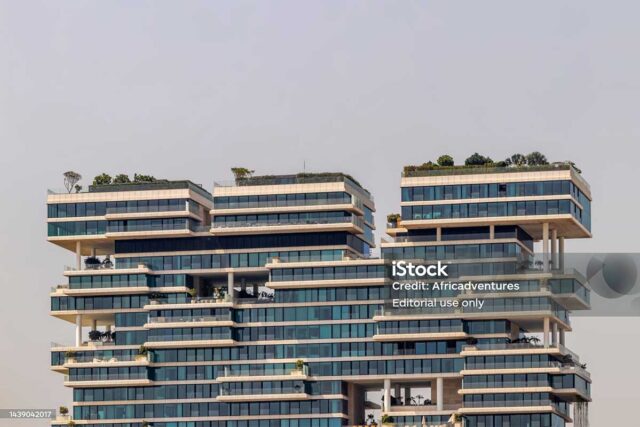
Understanding the Rental Market in the UAE
The UAE’s rental market is diverse, offering a wide range of options for tenants. Dubai and Abu Dhabi are known for luxury apartments and high-end villas, while Sharjah, Ajman, and Ras Al Khaimah provide more affordable housing options. Rental prices vary depending on location, property type, and amenities, making it crucial for tenants to research market trends before committing to a lease. Areas close to metro stations, business hubs, and schools tend to have higher rents, while suburban neighborhoods offer more space at lower prices.
Types of Rental Properties in the UAE
Renters in the UAE can choose from various property types based on their lifestyle and budget. Apartments are the most common choice, ranging from studios to multi-bedroom units in high-rise buildings with modern facilities.
Villas and townhouses are ideal for families looking for spacious homes with private gardens and parking spaces. For those seeking short-term or hassle-free living, serviced apartments offer fully furnished units with hotel-like services. Shared accommodations are also popular among professionals who want to split rental costs while enjoying convenient locations.
Steps to Renting a Property in the UAE
- Choose the Right Location
Select a location based on proximity to work, schools, public transport, and lifestyle preferences. Consider areas that fit your budget and offer the amenities you need. - Set a Realistic Budget
Factor in not just the monthly rent but also upfront costs like security deposits, agency fees, and utility setup charges. Ensure the rental amount aligns with your financial situation. - Work with a Registered Real Estate Agent
Hiring a licensed real estate agent can help you find the best rental options, negotiate terms, and handle legal paperwork, making the process smoother and more secure. - Review and Sign the Tenancy Contract
Carefully go through the lease agreement to understand rent terms, payment schedules, maintenance responsibilities, and renewal or termination clauses before signing. - Make Payments and Collect the Keys
Pay the required security deposit and post-dated cheques as agreed with the landlord. Once payments are completed, you will receive the keys to your new home.
Understanding Your Rights as a Tenant
The UAE has strong rental laws that protect tenants and landlords. In Dubai, rent increases are regulated by the RERA rental index, preventing landlords from raising rent arbitrarily. Tenants have the right to stay in a property as long as they adhere to the contract, and landlords must provide a 90-day notice if they intend to change terms or evict tenants upon lease expiration.
Maintenance responsibilities should be outlined in the lease, with landlords typically covering major repairs while tenants handle minor fixes. At the end of the lease, tenants are entitled to a security deposit refund, provided the property is returned in good condition.
Hidden Costs to Consider When Renting
Beyond monthly rent, tenants must budget for additional expenses when renting in the UAE. A security deposit, usually 5-10% of the annual rent, is required upfront. Real estate agencies charge fees, typically 5% of the yearly rent. Utility deposits, Ejari or Tawtheeq registration fees, and chiller charges for air conditioning can add to costs. Moving expenses, furnishing the home, and setting up internet and TV subscriptions should also be considered. Understanding these hidden costs ensures tenants avoid financial surprises.
Tips for Negotiating Rent in the UAE
Negotiating rent can help tenants secure better deals, especially in a fluctuating market. Researching current rental rates in the desired area provides leverage for negotiations. Offering fewer cheques for payment may encourage landlords to lower rent, as lump sum payments reduce their financial risks. Tenants can also negotiate for additional benefits, such as free maintenance, parking, or minor upgrades. Renting during off-peak seasons, such as summer or year-end, may lead to better deals as landlords seek to fill vacant units.
Short-Term vs. Long-Term Rentals
Tenants in the UAE can choose between short-term and long-term rentals based on their needs. Short-term rentals, including serviced apartments and Airbnb listings, are ideal for business travelers, tourists, or those unsure of their long-term plans. These rentals offer flexibility but often come at a higher cost. Long-term rentals, usually requiring a 12-month contract, offer more stability and lower overall costs. Many landlords prefer tenants who commit to long-term leases, as it reduces turnover and administrative work.
What to Do at the End of Your Tenancy?
As the lease nears expiration, tenants must decide whether to renew, renegotiate, or vacate the property. If renewing, discussing new rental terms in advance helps avoid last-minute surprises. If moving out, providing the landlord with a 90-day notice ensures a smooth exit. Before handing over the property, tenants should conduct minor repairs and ensure the home is in good condition to secure a full security deposit refund. Returning keys and obtaining a move-out clearance from the landlord finalizes the process.
Conclusion
Renting a property in the UAE can be a straightforward process with proper planning and knowledge of local regulations. Understanding market trends, tenant rights, and hidden costs helps renters make informed decisions. Whether looking for a luxury apartment in Dubai or an affordable villa in Sharjah, choosing the right location and negotiating favorable terms can make a significant difference in the rental experience.
Start your journey today and be part of a city that’s shaping the future by contacting UAE Property Pros today.





Leave a Reply